German President Joachim Gauck’s first state visit to Israel has been important politically. But what have the Israelis made of him?
German President Joachim Gauck had a packed a schedule on his first state visit to Israel. He was greeted by the Israeli president. He met various other politicians including Israel's prime minister, foreign minister and opposition leader. There were marching bands and state banquets. But he also had lunch with one of Israel's leading left-wing writers, David Grossman, and met survivors of the terror attack at the Munich Olympics in 1972, where 11 members of the Israeli team were murdered by a Palestinian hit squad from the Black September group.
This visit was important politically, and was front page of Israel's main newspaper at the start of the week. But it was soon pushed lower down in the TV news bulletins, overtaken by the massacres in Houla in Syria, Iranian progress on its nuclear enrichment program and the revelation of a computer worm, which infiltrated computers in Iran, Syria and the Palestinian territories.
Two presidents
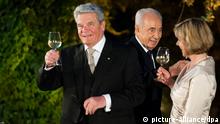
Gauck and his partner were warmly received by the Israeli president
Whether or not the Israeli public were paying much attention, President Gauck was warmly received by his Israeli counterpart Shimon Peres. Peres acknowledged the new German president's record as a human rights campaigner. A former Lutheran pastor, 72-year-old Gauck came to prominence as a civil rights activist in the former East Germany.
"This record makes your election a credit to the German people - a sign of its unwavering commitment to democracy," said Peres.
Peres referred to the ties that bind Germans and Jews, saying that Israel would never forget the Holocaust, and the murder of six million Jews in Europe. But he also acknowledged the need to look forward, and described the current relationship between Germany and Israel as a sign of inspiration, highlighting the possibility for reconciliation in all relationships.
Remembering the past
When Gauck visited Israel's Holocaust memorial Museum, Yad Vashem, in Jerusalem, he was shown new documents acquired by the archive. They included a memo from 1941 detailing plans for the notorious Nazi death camp, Auschwitz.
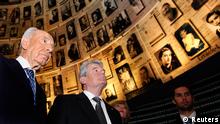
Gauck visited the Holocaust memorial museum, Yad Vshem
"They were completed and approved within two weeks - it's signed by all the architects who worked on it, and initialed at the top by Commander of the SS Heinrich Himmler,” explained archive director, Haim Gertner.
This blueprint was presented to Yad Vashem by the German newspaper Bild three years ago, after it had been found in an attic in Berlin.
In the Yad Vashem visitors' book, Gauck wrote, "we must forever remember the victims, and this terrible tragedy that befell the Jewish people, and always stand beside the Jewish people who established this special memorial."
Survivors of Munich massacre
During the visit, Gauck met members of the 1972 Israeli Olympic team. Long distance race walker Shaul Ladany was one of the survivors of the attack in Munich. He has an extraordinary personal history, having also survived the Holocaust. As a child during World War II, he was imprisoned in the Bergen Belsen concentration camp. After the war the surviving members of his family moved to Israel where Ladany became an engineer - and an athlete.
"I competed in Mexico City in 1968, but Munich overshadowed everything," he told DW.
Ladany was positive after meeting President Gauck at Jerusalem's King David Hotel.
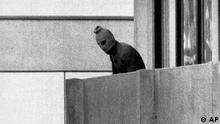
11 Israelis were killed in Munich during the 1972 Olympics
"Gauck was very warm and friendly. His body language, the way he spoke, his facial expressions. Since we didn't discuss politics I suppose we were an easy audience, but he asked us all personal questions, and was instantly likable."
As a gesture of appreciation, Ladany brought Gauck a gift.
"It is an 80-year-old book in Gothic German script from my late parents' library - Staatsbürgerkunde by Hans Kania - a primer in civics and democracy. I inscribed it as a memento of his meeting with survivors of Israel's Olympic team."
Symbolism
Natan Szajnberg, Professor of Sociology at the Tel Aviv Jaffo Academy, said it was symbolic that Gauck had chosen Israel for his first overseas visit as German president.
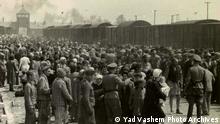
Gauck was shown a blueprint for the Auschwitz concentration camp
"With the storm brewing about the Euro he could have gone to Greece. Or he could be in Poland - but he chose to come here. He is seeking some self-understanding, as well as cementing a relationship important to Germany because of its history," said Szajnberg. "He will express the right amount of remorse, as he can in a way since he was a child during WWII, and he will do Germany proud. I don't know if Germans would want a Protestant moralist as Chancellor. But he fits the role of President very well."
In Jerusalem, Gauck steered clear of comments about controversial issues such as continued expansion of Jewish settlements in the West Bank, though his visit also included a day in Ramallah, meeting Palestinian leaders.
Gauck did comment on the dangers of an Iranian nuclear program, and criticized a controversial poem written by Günter Grass on this subject earlier this year. He said Grass's comments angered him, and he does not believe they represent the view of the majority of Germans.
"The Iranian nuclear program threatens not only Israel and the region, but also Europe. That's why we are committed to negotiations to try and reduce this threat."
Natan Szajnberg gave a more cynical response:
"The controversy with Grass was the best thing that happened to Gauck. Grass gave him a huge free pass. Now Gauck can consolidate himself as the antithesis of Gunter Grass."
Author: Irris Makler, Jerusalem
Editor: Joanna Impey DW DE
Editor: Joanna Impey DW DE
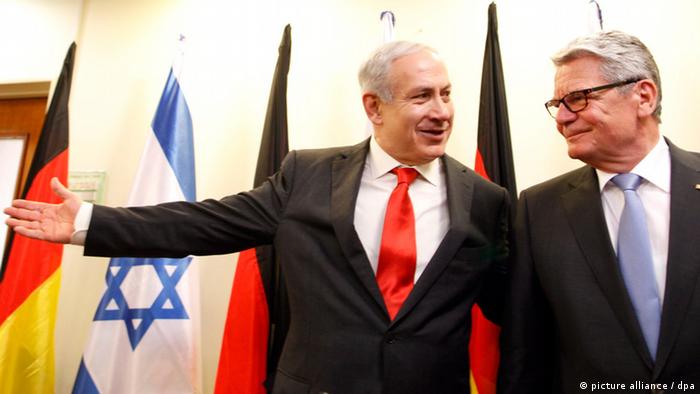
Comments